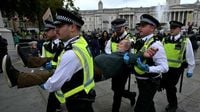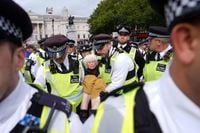Police powers in England and Wales are set to undergo a significant transformation following a series of high-profile protests and a recent terrorist attack, as the UK government moves to grant law enforcement broader authority to limit or even ban repeated demonstrations. The announcement, made by Home Secretary Shabana Mahmood on October 5, 2025, comes on the heels of weeks of mass protests, nearly 500 arrests in one day, and mounting concerns from both religious communities and civil liberties advocates.
According to BBC News, the new measures will allow police officers to consider the "cumulative impact" of demonstrations when deciding whether to impose restrictions. This marks a substantial shift from previous policy, where each protest was typically judged on its own merits. Under the proposed amendments to Sections 12 and 14 of the Public Order Act 1986, senior officers could relocate events, impose conditions, or prosecute organizers for breaches if the collective effect of repeated protests is deemed disruptive or threatening to public safety.
Home Secretary Mahmood emphasized the delicate balance between safeguarding the right to protest and ensuring that communities feel secure. In a statement quoted by Bloomberg and AP News, she said, "The right to protest is a fundamental freedom in our country. However, this freedom must be balanced with the freedom of their neighbors to live their lives without fear. Large, repeated protests can leave sections of our country, particularly religious communities, feeling unsafe, intimidated, and scared to leave their homes."
The immediate impetus for these changes was a pro-Palestinian demonstration in Trafalgar Square on October 4, 2025, which saw almost 500 people arrested—many for supporting Palestine Action, a group recently proscribed as a terrorist organization by the UK government. As The Guardian reports, the crackdown followed Prime Minister Keir Starmer's call for organizers to cancel the event out of respect for the Jewish community, after a deadly attack on a Manchester synagogue during Yom Kippur left two Jewish men dead.
Pro-Palestinian rallies have been a regular occurrence since the start of Israel's military offensive in Gaza, which, according to the Gaza Health Ministry (part of the Hamas-run government), has resulted in more than 67,000 Palestinian deaths. While the protests have largely been peaceful, some Jewish communities have reported feeling threatened by chants such as "From the river to the sea, Palestine will be free," and there have been a handful of arrests for supporting Hamas, another banned organization in the UK.
The government’s response has been swift and multifaceted. Policing Minister Sarah Jones met with Metropolitan Police leaders at Lambeth Police HQ to discuss the aftermath of the recent protests and explore how new technologies, such as live facial recognition, could aid in policing efforts. The government is also set to review existing legislation, including the forthcoming Crime and Policing Bill, which proposes measures like banning pyrotechnics at protests, criminalizing the climbing of war memorials, and prohibiting the use of face coverings at designated demonstrations.
In the wake of the Manchester synagogue attack, Housing Secretary Steve Reed wrote to local authorities, urging them to use all available resources and powers to protect Jewish communities—including limiting protest activity where necessary. Police forces across England and Wales are now working with the Community Security Trust to provide extra support to over 500 synagogues and Jewish community sites, a move designed to reassure communities and deter further hate crimes.
Mahmood’s announcement has not gone unchallenged. The Guardian and The Times both highlight alarm among civil liberties groups and some Labour MPs, who argue that the proposed powers risk undermining democratic freedoms. Critics say the government is restricting free speech and the right to protest, with Defend Our Juries, the group behind Saturday’s demonstration, declaring the measures "an extraordinary new affront to our democracy." They warn that such steps could "fuel the growing backlash" against the ban on Palestine Action and stifle legitimate dissent.
Since Palestine Action was proscribed in July 2025, more than 2,000 people have been arrested at related protests, with over 130 charged with terrorism offenses, according to AP News. The government’s tough stance is, in part, a response to what Mahmood has described as a "rising tide of antisemitism and other forms of hatred" in Britain. She told Times Radio, "There are clearly malign and dark forces running amok across our country." This concern was underscored by a suspected arson attack on a mosque in Peacehaven, England, on October 4, 2025, which police are treating as a hate crime.
Amid these developments, hundreds of people waving Israeli and British flags rallied in London and Manchester to mark two years since the October 7, 2023, Hamas attack on southern Israel and to mourn the victims of the Manchester synagogue attack. The events underscored the deep divisions and heightened tensions that have gripped the UK in the context of the ongoing Middle East conflict.
Meanwhile, the debate over the new police powers has taken on a broader political dimension. Some Conservative politicians have called for even stronger measures, with The Times reporting that Mahmood is considering giving police the power to ban protests outright. This has drawn further criticism from civil liberties advocates, who fear a slippery slope toward authoritarianism. Two Labour MPs have publicly expressed concern, echoing warnings from organizations like Liberty and Amnesty International about the potential erosion of democratic rights.
Supporters of the government’s approach argue that extraordinary times call for extraordinary measures, pointing to the need to protect vulnerable communities and prevent violence. They emphasize that the right to protest remains enshrined in law, but must be exercised responsibly and with respect for the safety of others. Opponents, however, warn that the new powers could be used to suppress dissent and silence marginalized voices, particularly those critical of government policy or foreign affairs.
In a gesture of appreciation and resolve, Home Secretary Mahmood planned to write to Chief Constables across England and Wales on October 6, 2025, thanking them for their response to recent unrest and encouraging the use of all available powers to prevent disorder and protect communities.
The coming weeks will likely see heated debate in Parliament and the courts over the scope and limits of protest rights in the UK. As the government reviews existing legislation and considers further steps, the challenge remains: how to balance the fundamental right to protest with the equally vital need to maintain public order and protect all communities from harm.
With tensions still running high and both sides of the debate deeply entrenched, the UK faces a defining moment in its approach to civil liberties, community safety, and the meaning of democracy itself.



